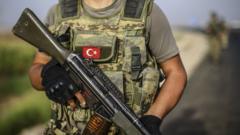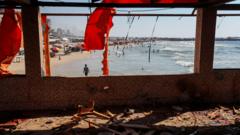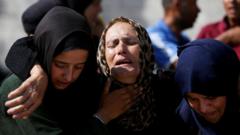This marks a significant step toward resolving longstanding tensions and could change the political landscape in Turkey and beyond.
**Kurdish PKK Begins Disarmament Process, Paving Path Towards Peace in Turkey Conflict**

**Kurdish PKK Begins Disarmament Process, Paving Path Towards Peace in Turkey Conflict**
In a historic move, the Kurdish PKK initiates a disarmament ceremony after decades of conflict with Turkey.
After four decades of armed conflict with the Turkish state, the Kurdish militant group PKK (Kurdistan Workers' Party) is set to commence a disarmament process, signifying a potential turning point in its fraught relationship with Turkey. A symbolic laying down of arms ceremony will be held in Iraqi Kurdistan, amidst tight security, as the group embarks on this new phase that is expected to span the summer months.
President Recep Tayyip Erdogan has praised this decision, describing it as a significant moment for Turkey. The 40-year conflict has claimed around 40,000 lives, and the PKK has been designated as a terrorist organization by Turkey, the U.S., the EU, and the UK. The ramifications of this disarmament extend beyond Turkey, impacting regions in Iraq, Syria, and Iran.
The disarmament process will begin with a small group ceremonially surrendering their weapons near Suleymaniyah, with plans to return to their bases following the event. Details regarding the exact location remain undisclosed for security purposes, though members of the pro-Kurdish opposition party, Dem, are expected to attend. Over the coming months, the disarmament will proceed with the cooperation of the Turkish government alongside Iraqi and Kurdistan regional governments.
Abdullah Ocalan, the imprisoned leader of the PKK, in a recent video reiterated the call for a shift from armed conflict to political engagement. Having been incarcerated since 1999, Ocalan’s influence remains significant, particularly among Kurds.
This development reflects a broader attempt at peace that has seen several false starts in the past, the most notable being a ceasefire announced in 2013, which ultimately deteriorated by 2015 amidst escalating violence, particularly in Kurdish-majority areas in southeastern Turkey.
Factors influencing this decision towards disarmament include political pressures from nationalist leaders and a changing attitude within Turkish politics, which have created an environment conducive to dialogue. Ocalan’s recent statements underscore the desire for a solution to the Kurdish issue through peaceful means.
As this process unfolds, attention will now shift to the Turkish parliament, where a commission is anticipated to outline steps for moving forward. The timeline for definitive resolutions remains unclear, particularly regarding Ocalan’s future and potential changes to the Turkish constitution—discussions that are emerging amid political maneuverings surrounding Erdogan’s presidency.
Overall, the PKK’s decision to disarm may herald a new chapter in Turkish-Kurdish relations, gathering both domestic and international interest. New alliances and political arrangements may form as the implications of this transition continue to be navigated.




















